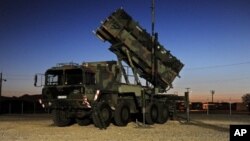NATO member Romania plans to buy Patriot missiles from U.S. company Raytheon to help protect its airspace, a senior Defense Ministry official said Thursday.
The purchase will be a key part of the European Union country's plan to modernize its military, benefiting from a gradual increase in annual spending.
The defense budget in Romania — a NATO member since 2004 and one of Washington's staunchest allies in Eastern Europe, along with Poland — was 1.7 percent of its gross domestic product in 2016 and was set at 2.0 percent this year.
"The Patriot missile defense system is part of the multilevel air defense system of Romania's airspace. We're assessing all options to develop this [acquisition] program," General Nicolae-Ionel Ciuca, chief of the General Staff, told reporters. "It is important to say the program will start this year."
The missiles would be part of an integrated air defense system comprising six newly acquired F-16 fighter jets as Romania is brings its forces up to NATO standards. Outdated communist-era MiGs are to be retired.
"Romania has announced their intent to enhance their defensive capability by procuring Patriot," a Raytheon spokesperson said. "Raytheon has a long-standing relationship with Romania and will work closely with the U.S. and Romanian governments to ensure this NATO partner achieves its defense objectives."
The size of the planned acquisition and the budget for it are still unknown.
Polish deal
Poland expects to sign a $7.6 billion deal with Raytheon to buy eight Patriot missile defense systems this year, Defense Minister Antoni Macierewicz said last month.
Romania, a country of 20 million people, hosts a U.S. ballistic missile defense station and has contributed troops in Iraq and Afghanistan.
The U.S. military, which says the defense station is needed as protection against Iran rather than to threaten Russia, switched on the $800 million Romanian part of the shield in 2015. Another part of the shield was due to be built in Poland.
Russian President Vladimir Putin has said Moscow views the missile shield in Eastern Europe as a "great danger" and that Moscow will be forced to respond by enhancing its own missile strike capability.





